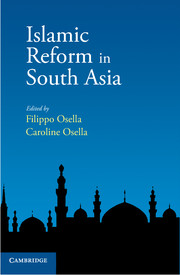Book contents
- Frontmatter
- Contents
- List of Contributors
- Introduction
- Part I Reformist Journeys
- Part II Debating Reform
- 5 The Enemy Within: Madrasa and Muslim Identity in North India
- 6 Islamism and Social Reform in Kerala, South India
- 7 Piety as Politics Amongst Muslim Women in Contemporary Sri Lanka
- 8 The Changing Perspectives of Three Muslim Men on the Question of Saint Worship over a 10-Year Period in Gujarat, Western India
- 9 Women, Politics and Islamism in Northern Pakistan
- 10 Violence, Reconstruction and Islamic Reform: Stories from the Muslim ‘Ghetto’
- Part III Everyday Politics of Reform
- Part IV Reform, State and Market
- Index
6 - Islamism and Social Reform in Kerala, South India
from Part II - Debating Reform
Published online by Cambridge University Press: 05 January 2014
- Frontmatter
- Contents
- List of Contributors
- Introduction
- Part I Reformist Journeys
- Part II Debating Reform
- 5 The Enemy Within: Madrasa and Muslim Identity in North India
- 6 Islamism and Social Reform in Kerala, South India
- 7 Piety as Politics Amongst Muslim Women in Contemporary Sri Lanka
- 8 The Changing Perspectives of Three Muslim Men on the Question of Saint Worship over a 10-Year Period in Gujarat, Western India
- 9 Women, Politics and Islamism in Northern Pakistan
- 10 Violence, Reconstruction and Islamic Reform: Stories from the Muslim ‘Ghetto’
- Part III Everyday Politics of Reform
- Part IV Reform, State and Market
- Index
Summary
Introduction
In Kerala we find strong currents of Islamic reformism, the largest organization being the Kerala Naduvathul Mujahideen (KNM). This radical reform movement, originating in the 1920s and (to date) limited to Kerala state, draws its inspiration from a wide range of strands both within India and from the wider Islamic world. Kerala's Islamic reformism is simultaneously local—in that it emerges within a specific social, political and historical context—and also pan-Islamic or transnational—in that it embodies orientations which historically characterize the development of Islam across the world. While Kerala's Mujahids (as KNM supporters are known) participate in wider currents and are part of a universalistic trend, at the same time, Mujahid projects cannot in any way be tritely subsumed under labels such as ‘global Islam’ (e.g., Roy 2004). Kerala reformism must be understood as being simultaneously part of a global Islamic impulse towards purification and also as a deeply locally rooted and specific phenomenon, which produces itself on the ground through practice and through dialogue with significant others, Muslim and non-Muslim alike. Indeed, public debate in Kerala between ‘reformist’ and ‘traditionalist’ Muslims produces shifts in practice and works continually to generate and redefine the focus of ‘reform’ and ‘anti-reform’.
We are here critiquing anthropological tendencies to idealise and celebrate sufi ‘traditionalism’ as somehow authentically South Asian in contrast to reformism, which is then inaccurately—and dangerously buttressing Hindutva rhetoric—branded as going against the grain of South Asian society.
- Type
- Chapter
- Information
- Islamic Reform in South Asia , pp. 139 - 170Publisher: Cambridge University PressPrint publication year: 2013
- 3
- Cited by



